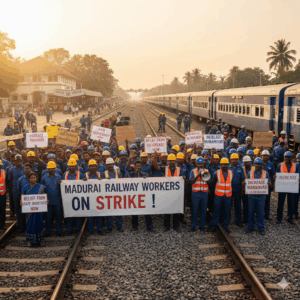Local News
On the Tracks of Protest: Madurai Railway Workers Demand Relief from Staff Shortage

It was a scene of quiet defiance at the Southern Railway divisional office in Madurai yesterday. Instead of the usual bustle of clerks hurrying with files and workers attending to schedules, nearly 90 employees of the Southern Railway Mazdoor Union sat cross-legged on the ground, placards raised, their voices echoing demands for dignity, safety, and relief.
The protest wasn’t a sudden outburst. For months, railway staff had murmured in frustration about being stretched beyond their limits. With over 150 posts lying vacant in the Madurai division alone, existing employees said they were carrying double the burden. Yesterday, those murmurs turned into loud, united voices.
“We Work Without Rest”
Ravi Kumar, a pointsman with 12 years of service, stood at the front of the gathering, his hands calloused from years of manual work. “Our schedules are disorganized. We are asked to cover duties for missing staff, sometimes two shifts back-to-back,” he said. “Railway safety depends on alert workers. But how can we be alert when we are exhausted?”
Behind him, others nodded. Some held charts showing how staff shortages in sections such as track maintenance, signaling, and ticket checking had led to dangerous workloads.
“There are nights when one man is asked to do the work of three,” added Lakshmi, a ticket examiner. “We are human, not machines.”
Cracks in the System
The Madurai railway division, one of the busiest in Tamil Nadu, connects thousands of passengers daily across districts. Yet, insiders say the backbone of the system—the workers—has been slowly crumbling. Vacant posts have piled up due to delayed recruitment and transfers.
The result? Staff are forced into long shifts, often without proper rest. This, workers argue, not only endangers their health but also the safety of passengers. Fatigue-induced errors in critical roles such as track inspections or signaling could spell disaster.
A Protest Born of Patience
The sit-in protest was symbolic. Workers did not stop trains or disrupt services, but they wanted their message to be loud and clear: staffing shortages must be addressed immediately.
Union leaders submitted a memorandum highlighting their demands:
Immediate filling of vacant posts in Madurai division.
Transparent scheduling of shifts to prevent overwork.
Regular safety checks to ensure staff are not stretched beyond limits.
Health and welfare measures for employees working long hours.
“This is not just about workers’ rights,” said Ramesh, a senior union leader. “It is about the safety of passengers who trust Indian Railways every single day.”
The Human Cost
As speeches continued, some workers shared personal stories. A young signal maintainer recalled missing his daughter’s school annual day because he had to cover a colleague’s night shift. Another worker said his health had deteriorated due to irregular hours, forcing him onto medication for hypertension.
The stories painted a picture that statistics could not: real people silently bearing the cost of an overburdened system.
Authorities Respond
Officials acknowledged the staff shortage but maintained that steps were being taken to recruit more personnel. A senior railway officer assured that vacancies had already been forwarded to the Railway Recruitment Board and that new appointments were expected in phases.
But for the workers in Madurai, patience had worn thin. “We’ve heard promises before,” one of them muttered, shaking his head.
The Road Ahead
As dusk fell, the protest concluded peacefully, with workers dispersing after reaffirming their unity. They warned that if demands were ignored, stronger demonstrations could follow.
For the people of Madurai who rely on trains daily—students, office-goers, traders, and pilgrims—the protest was a reminder of the invisible human network that keeps the system running. The clanging of train wheels and the rhythmic whistle of locomotives may define the railway, but it is the strength of its workers that truly keeps the tracks alive.
Yesterday, those workers reminded everyone: before steel and schedules, the railway runs on human resilience—and that resilience has its limits.






